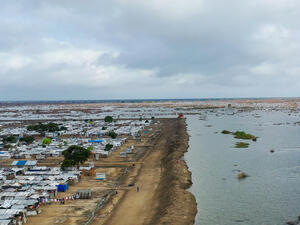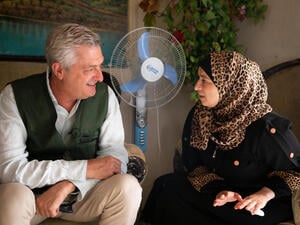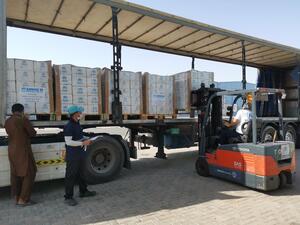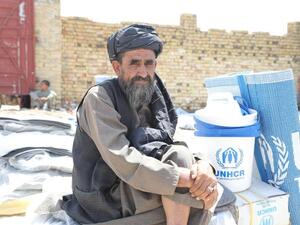UNHCR plans tent camp in Beirut to address acute shortage of housing
UNHCR plans tent camp in Beirut to address acute shortage of housing

A woman and three children fill bottles with water at a school housing displaced people in Lebanon's Jbail Governorate. UNHCR is helping the government deal with a shortage of accomodation by preparing sites for tented camps.
BEIRUT, Lebanon, August 2 (UNHCR) - The growing number of displaced people in Lebanon is putting a strain on housing, prompting UNHCR and its partners to draw up plans for the creation of temporary tented camps in Beirut.
The Lebanese government's Higher Relief Committee says about 550,000 displaced people are living with families, some 130,000 are living in organised shelters - mainly schools - and about 200,000 have sought refuge in Syria. All are in urgent need of help now, while further problems will be faced in mid-September when schools are due to reopen.
In a bid to alleviate the problem, UNHCR is working with the government and others to develop a tented camp for 800-1,000 displaced people at an old railway depot in Beirut's Furn El Shabak district. UNHCR has visited a second potential site, while the Swiss Agency for Development and Cooperation is helping develop another camp.
"A tented site may not be the ideal solution for the displaced," said Stephane Jaquemet, UNHCR's representative in Lebanon, "but there is an urgent need to find alternative housing, given the increasing needs and the fact that almost all public schools in the country are presently occupied by IDPs [internally displaced people]. Children will need to go back to school soon."
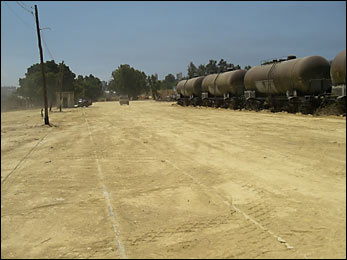
The old railway depot in Beirut's Furn El Shabak district, where work is going on to develop a tented camp for 800-1000 displaced people.
UNHCR has been assisting with the design of the site, to ensure that humanitarian standards will be adhered to. These dictate that each person should have at least 3.5-square metres of covered living space, lighting should be erected at strategic points to minimise security risks, and there should be easy access to sanitation, health, education and religious facilities.
The site has been cleared for development and Oxfam is working on water and sanitation, while French army personnel are working on ensuring electricity supplies. UNHCR's durable new lightweight family tents, which allow for more privacy and comfort, will be pitched at the site.
"The government is concentrating on compact, small urban areas which cater for smaller amounts of displaced persons," said UNHCR engineer Aidan Cronin. "The smaller sites make planning more difficult, as irregular shapes require more intensive planning of services such as toilets, water and electricity."
Elsewhere in Lebanon, UNHCR staff continue rushing goods to the needy displaced, but only one joint UN convoy was cleared to travel on Wednesday south to Tyre in the conflict zone. Among other emergency items, the trucks will be carrying 1,000 UNHCR blankets and 500 mattresses.
On Monday and Tuesday UNHCR distributed 1,025 blankets, 420 mattresses and 54 kitchen sets to displaced people in the Aley Valley north of Beirut. On Wednesday and Thursday, 4,250 blankets and 1,670 mattresses were due to be distributed in Metn governorate.
Meanwhile, UNHCR is trying to set up a regular supply pipeline between Syria and Lebanon, bringing in much needed relief items from its emergency stockpile in Jordan. Since the overland delivery route from Syria via the Al Aarida border crossing point opened on Saturday, UNHCR has sent three convoys to Beirut loaded with a total of 436 tonnes of blankets, mattresses, kitchen sets and tents.
On Thursday, the largest convoy yet, carrying 175.6 tonnes of plastic sheets, plastic rolls for shelter, tents, mattresses and kitchen is scheduled to depart Syria and arrive in Beirut.
In a welcome move on Wednesday, the UNHCR office in Lebanon entered into a partnership with the Al Waleed Bin Talal Humanitarian Foundation-Lebanon to support the displaced people in Lebanon. "This partnership comes at a critical time for the Lebanese people and we warmly welcome the new cooperation and the faith extended to us," said Jaquemet.
By Astrid van Genderen Stort in Beirut, Lebanon


